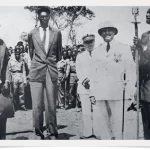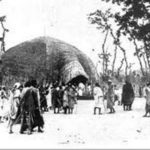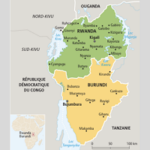The Social Impact of the New Game
One of the blinders on colonial perceptions resulted from the perpetuation of the myth of indirect rule. Because he was local to Ijwi and a member of the royal family, Bera was anointed by the colonial regime as a “traditional” authority. However, neither he nor the authority which he administered were part of traditional Ijwi political life. Indeed, as implied above, it would have been difficult for a truly traditional authority to have fit into the new political framework, andit was in fact Bera’s status as nontraditional authority (and indeed as a non-authority) to the Bany’Iju that perhaps best suited him to participate so effectively in the new arena. Similar observations could be made about Rubenga and Muhamiriza. On the other hand, while as a member of the royal family he may have been seen as legitimate, to the Belgians, he was a catalyst for strenuous opposition for much of the population on Ijwi because his northern origins represented the major opposition to the royal line in the south, and a principal sym-bol of internal insubordination. His appointments and policies only confirmed this view and intensified the bitterness.
The most important changes, however, were not in personnel, but in institutions—in administrative demands and in the exercise of power. The new authorities made zealous demands of tax collections and labor recruitment. Men were sent to work on plantations, to cut and saw lumber in the forest, to build roads. They were also expected to provide food, including cattle, for the colonially imposed elite. In addition, the population had direct responsibilities to Bera and his successors: working in the chief’s personal fields (busane), producing food crops that were later sold, was only one form of nontraditional trib-ute.51 Men in the north frequently mentioned that it was only under Bera that they first paid for the right to settle on the land; some, however, also noted that their family had provided the payment earlier, but had had to pay again under Bera, a miscarriage of justice in their eyes. Others mentioned the constant harassment of the work they were called on to perform—constructing canoes, pro-viding services such as chopping wood, fetching water, porterage, maintaining the buildings in Bera’s enclosure, or rowing Bera and his soldiers on frequent trips to meet the colonial authorities at Kalehe. Men called for such service were expected provide their own food for the trip. Still others speak of greatly in-creased demands for food provisions and an augmentation in the required acreage of obligatory crops (maendeleo fields). Most of these demands were new—if not in nature, at least in the quantities required.
The New Pattern of “Legitimate” Status among the Elites
Much of Bera’s new-found power resulted from the colonial situation. Yet his behavior reflects the alacrity with which he sought to use these powers at the expense of what might formerly have been seen as his constituency. For all the powers that Bera exercised, his single-minded dedication to achieving political goals determined by outside demands appears to have made him less accepted by the population. Many stress the fact that Bera was not a true mwami. He was never enthroned, never endowed with the rituals and responsibilities of royalty. The new structures required of him something different.
Bera’s colonial orientation can be seen in the friendship patterns that he forged with other chiefs. Although he did not entirely neglect Ijwi’s social networks, Bera’s principal network of institutionalized links (measured through the exchange of cattle and marriage ties) was with chiefs outside the island. In particular, he had ties to chiefs of a status similar to his own, had come to prominence under colonial rule; the major characteristic of these authorities was administrative efficiency and apparent loyalty within the colonial framework. Bera’s closest marriage ties were with Bigilimani, the exemplary colonial chief of the Lake Kivu region, who administered the peninsula of Buzi at the northwest corner of the lake, an area that had historically maintained many social ties with the population of northern Ijwi. Bera was Bigilimani’s maternal uncle, a position of very close affinity within the Havu kinship network. Bigilimani had also married both a daughter and a granddaughter of Bera’s. The ties of the two families were strengthened in the next generation as at least one of Bigilimani’s sons took wives from Ijwi and lived on the island. In addition, Bera and his sons had cattle ties with several chiefs around the Kivu area: in Kalonge, in Mpinga Nord (a subsidiary chiefdom of Kalehe), and in Luhihi. Finally, Bera had contact with Rwanda, forged during his long exile there. Several of his older children had been born to a Rwandan wife, and his ties to the east were continued through cattle exchanges and marriage ties of some of his sons.
Because the mwami and his sons were all exiled for such long periods of time, it is impossible to characterize the social network of the royal line within a comparable context. It is nonetheless significant that (at least until the death of Ntambuka in 1981) the king in the south had placed much less importance on external ties of this nature than had his counterpart in the north. Still, it was notable that the family of the king claimed “friendship” (that is, social identity) with other fully enthroned bami of the region rather than with the colonially emergent elite. The closest marriage ties were with the kingdom of Ngweshe, in southern Bushi, but this is more a historical product of Ndogosa’s exile during the Rwandan occupation of Ijwi than of any planned strategy of social alliance during the colonial period. Otherwise, claims were made of ties with the kings of Buhunde, Bushi (Buhaya), and even (despite the strained political relations) with Kalehe as well as Karhana, an ambiguous state whose ritual independenceof the parent Shi kingdom (Buhaya) seems to have occurred largely during the colonial period; Karhana is a lakeshore kingdom, however, one of the closest to Ijwi, and the two are united in their antipathy toward the Kalehe line.
Secondary Social Change under Colonial Rule
Other social alterations occurring during this period had a less direct impact on the population than did the administrative impositions discussed above, but they were of no less long-term importance. One such factor was the constraint placed on population mobility during colonial rule. Historically, demographic mobility in the lakeshore regions had been fostered by general cultural similarities that transcended political and ethnic divisions. By its very location, Ijwi had become a geographical focus for this movement. Mobility and interchange had always served as an important countercheck to the abuse—or even consolidation —of royal power on the island. The several political units of the lakeshore areas were largely independent of each other and in fact competed among themselves for prestige and power, translated into population numbers.
During the initial stages of colonial imposition, mobility from some parts of the island and lakeshore areas apparently greatly increased. Kinyaga (in south-western Rwanda) and the eastern parts of Ijwi were especially affected. This was reflected in the preoccupation with these movements apparent in the colonial documents, as noted above; it is even more apparent in the oral data derived from some parts of Ijwi (the eastern shore in particular).But whereas in earlier times such flight and migration could have had an important impact on political balance within the region, during the colonial period it did not markedly affect the character of political rule and oppression, because political power was no longer based ultimately on internal support and population acquiescence. Increasingly, mobility became more a question of individual flight than the movement of families or whole groups. As colonial administrative efficiency increased through-out the region through the services of men like Bera, colonial exactions became more difficult to avoid by moving to new areas, and the general mobility of the population substantially declined during and after the 1930s.
Important changes in the nature of social ties were also evident during this period. The cattle epidemics of the late nineteenth century and the devastating cattle raids conducted against Ijwi by early Europeans both from Rwanda and from the Zairean mainland had greatly reduced the cattle on Ijwi. This had also reduced the need for pasture, and much of the land that had formerly served as pasturage lay vacant during the later years of European establishment on Ijwi. Eventually much of this land was incorporated into the Belgian-owned plantation, Linea, which came to include approximately one-sixth of the island. Other areas, those in the highland watershed of the island, were set aside as forest re-serve. Thus, not only through population growth but also through colonial policy, land came to be an increasingly scarce resource, and hence increasingly valuable. Control over access to land, consequently, became one of the major tools (and weapons) in the chief’s administrative arsenal, and the new discretionary administrative powers and police force facilitated the imposition of such control. These measures provided direct benefits the ruling group in two ways: from those willing to pay for land, and from the productive resources of those “clients” who worked the chief’s fields.
Marriage patterns were also affected. Formerly, matrilateral cross-cousin marriages (ubuzala) had increased lineage solidarity by reinforcing the moral obligations of reciprocity between mother’s brother and sister’s son. They also minimized the expected bride wealth (beyond ritually prescribed exchanges), since the groom’s mother’s brother was principal donor of bride wealth to his sister’s son, and a recipient of the same bridewealth as father-in-law. But under colonial rule, individual accumulation of wealth became more important while reciprocal work obligations and lineage solidarity became less important. It was no longer so incumbent on the father to provide for the son’s marriage; indeed, since much of the bridewealth had formerly been drawn from other sources, with the constriction of lineage responsibilities the father alone was often unable to provide it all. As reciprocity and lineage solidarity declined, the maternal uncles no longer found it advantageous to contribute to their sororal nephews’bridewealth; indeed, since bridewealth was no longer distributed so widely among the members of the recipient lineage, participation in ubuzala marriage meant forgoing the potential wealth to be derived from forging marriage bonds outside the family. Younger men were increasingly expected to find their own bridewealth; to be sure, with new employment possibilities in the colonial sphere, they often preferred to do so, thus freeing themselves from their fathers’ influence in marriage. Consequently, what had formerly been a predominant marriage pattern became increasingly rare, restricted to the very young and very poor and increasingly seen as a sign of poverty on the part of the bridegroom. Instead, young men be-came dependent on the generosity of the wealthy, men like Bera, to provide them with bridewealth, and thus the perpetuation of the family became related to retaining Bera’s goodwill.
Finally, social repercussions were apparent in the changing relationships with royalty experienced by the northern and southern parts of the island. In pre-colonial times, areas in the south had enjoyed proximity to the central court, and both institutionalized and informal ties had developed between the kingship and certain segments of the population. Though by no means did all people had access to the king, influences from many directions were brought to bear on the king’s decisions, and the court therefore did remain intimately tied to important strains of popular sentiment. The north, however, had been historically distant from kingship. Although all the kings had residences and/or marriage ties in the north, that region never became a focal point of royal interest. Thus in comparison to the south, the northern areas of the island were much less involved in court affairs and decisions.
In their relations to kingship, people in the north generally showed two characteristics that distinguished them from people in the south. Those groups in the north that had preceded the arrival of the royal family on Ijwi and maintained a strong corporate sentiment tended to remain aloof from kingship; they never fully participated in the social, political, or ritual aspects of royalty in nineteenth-century Ijwi. On the other hand, a significant proportion of the population of the north appear to have settled there after the establishment of royalty in the south. These groups do not reflect a strong corporate tradition in political matters, especially in dealing with kingship; often their strongest links are with communities in the south rather than in their own locale.
By contrast, in the south, early corporate groups were more effectively integrated into the network of kingship on Ijwi through ritual and social ties. Nevertheless, in dealing with kingship, many of these groups maintained their own strong corporate identity. On certain occasions this manifested itself in overt opposition to the king—a tradition which has continued in the south even into postcolonial times. In the north, opposition at the level of corporate identity was never expressed so openly, nor were enduring ties with kingship developed at the group level. Thus in the south, for example, many people would share in the prestige of the king’s marriage to a member of their lineage; in the north, only the immediate family would identify with such a marriage
It is interesting that the nature of colonial resistance differed between north and south. The north was Bera’s own region; the new colonial demands were most directly imposed there, and that part of the island seems to have experienced more effective political penetration in terms of work obligations for the local authorities. In the north, the people were more dependent on Bera’s regime and less willing to act collectively to oppose administrative exactions. In the south, there were demands too, equally as heavy and with the added burden of two military occupations. The techniques of administration, in fact, may well have been more harsh, to judge from a comparison of oral reminiscences today. But in the south Bera was an outsider, facing more coherent group identity. Given this context, it is possible that the south was administered with less zealous surveillance by Bera. Certainly, it was administered with less assurance: it appears that administrative demands were less effective there than in the north. Resist-ance was more marked in the south, therefore, both because a tradition of social cohesion there had made the population better able to oppose exactions and be-cause people especially resented the impositions by northerners—by Bera and his appointed village capitas. In this area today, people frequently remark on the illegitimacy of these colonial officials; it is likely also that this feeling includes a sense of diminished status and resentment at having almost none of the influence or maneuvering capability that they had held previously through positions of influence, or at least through their presence, at the royal court. The older men on Ijwi today imply that group cohesion (of clans, sub-clans, or regional groups) diminished during the colonial period because these groups no longer functioned as instruments of corporate political influence. Thus, the historical identification of people in the south with the network of royalty may well have made them more willing to resist Bera’s demands (and colonial demands in general) as illegitimate exactions. Their social traditions, including their group cohesion and intensive interaction with areas outside the island, may have rendered their resistance more effective
https://uk.amateka.net/the-social-impact-of-the-new-game/https://uk.amateka.net/wp-content/uploads/2020/09/elections_rda.pnghttps://uk.amateka.net/wp-content/uploads/2020/09/elections_rda-150x150.pngSocial & cultureOne of the blinders on colonial perceptions resulted from the perpetuation of the myth of indirect rule. Because he was local to Ijwi and a member of the royal family, Bera was anointed by the colonial regime as a “traditional” authority. However, neither he nor the authority which he...BarataBarata rpierre@ikaze.netAdministratorAMATEKA | HISTORY OF RWANDA



